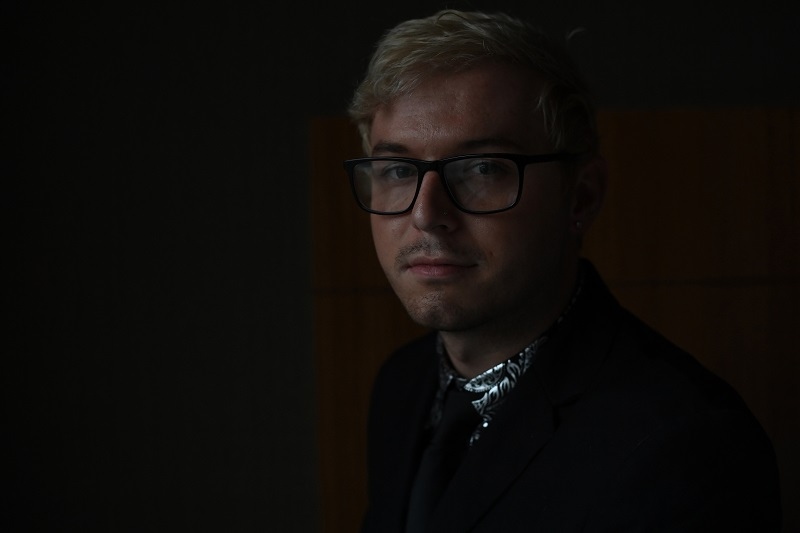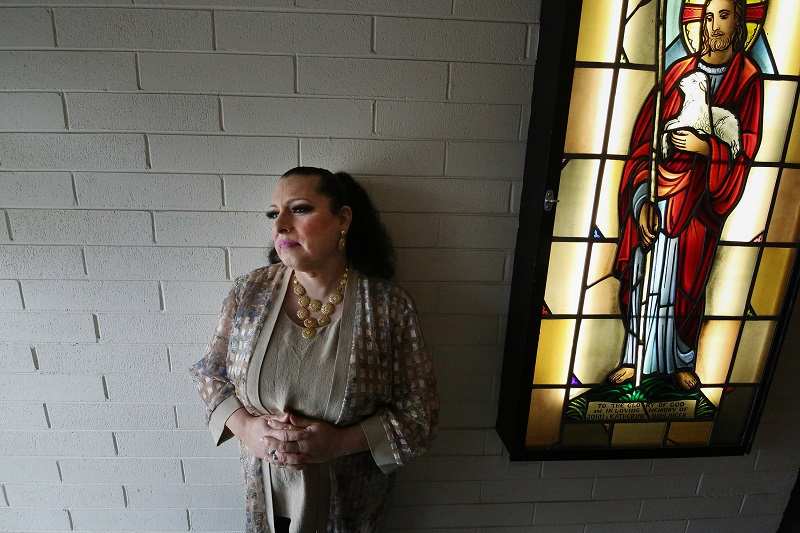
Club Q bartender Michael Anderson poses for a portrait at his hotel on Dec. 14 in Washington. Anderson was working at Club Q in Colorado Springs last month during a mass shooting, where a gunman killed five people and wounded 25 more victims.
11:18 JST, December 30, 2022
Like many business owners, Dave Peruzza keeps a first-aid kit on hand in case of accidents – a knick on the finger, maybe, or an allergic reaction. But in recent weeks, the owner of two Washington queer bars, Pitchers and A League of Her Own, added a new item to his kit: a tourniquet.
For most bar owners, “you don’t think about that stuff,” meaning the kind of device you need on hand to save someone from a gunshot wound, Peruzza said. But after November’s deadly shooting at Club Q, a Colorado Springs LGBTQ club, Peruzza, who considered himself vigilant about safety before, is even more “hyper aware.”
“It’s nerve-racking for me and my security,” Peruzza said. One of his bar managers recently completed an active shooter training, and there are plans to conduct another one at the bar, he said.
But, Peruzza added, thinking about how to keep his queer and trans customers safe has been a constant focus since the beginning: “It’s just something that’s always been in the back of my mind.”
LGBTQ spaces – such as queer bars, community centers and gay-owned businesses – have long had to prioritize safety, especially in places where they historically could not rely on police to keep them safe.
Now, an old problem has reached a new level of urgency, business owners, performers and community leaders say. After a year where anti-LGBTQ attacks have intensified across the country, many gay and trans communities are rethinking how to best protect themselves.
Several national organizations have launched new initiatives aimed at strengthening defenses; local businesses have stepped up safety trainings for staff; and individuals are seeking classes and resources for de-escalating attacks.
For LGBTQ business owners, safety is “the number one issue. Period. Hands down. By a mile,” said Justin Nelson, co-founder and president of the National LGBT Chamber of Commerce.
Safety efforts are complicated by the many forms these threats have taken, advocates, performers and researchers said. At school board meetings, protesters have accused teachers and officials of promoting a “gender ideology” and “grooming” children for abuse. Extremists have threatened children’s hospitals. Members of the Patriot Front, a white supremacist group, were arrested in June for plotting a riot at a Pride event. In statehouses across the country, lawmakers filed scores of bills aimed at curbing the rights of LGBTQ educators, youth and families.
Jonathan Hamilt, executive director of Drag Story Hour, which supports organizers of such events, said there’s always been “some pushback” to its programming.
“We had sort of, like, the Westboro Baptist-style protests where they’d be across the street praying,” Hamilt said.
But the energy of these protests has shifted, said Hamilt. “We’ve become targets for white supremacy groups.”
Denise Spivak, CEO of Centerlink, an association of LGBTQ centers, said this coordinated extremist element is what makes this year’s attacks stand out from other periods of anti-LGBTQ violence.
“Our centers are now in a place where Jewish temples and Planned Parenthoods have been for decades,” Spivak said.
And these kinds of threats are no longer limited to a few conservative pockets of the country, said Nelson. “It’s happening in New York City, in Miami, here in Washington, D.C. . . . It’s happening everywhere now.”
Many LGBTQ advocates don’t see the threat level abating anytime soon – and data supports their views.
In the immediate aftermath of the Club Q shooting, social media posts using the term “pedophiles” and “groomers” increased, one report found.
“Generally, there is an outpouring of, as they say, ‘thoughts and prayers,'” said Moustafa Ayad, an executive director at the Institute for Strategic Dialogue, which monitors extremism across the world. Instead, far-right groups and influencers attempted to justify the mass shooting.
This discourse – and the timing of it – “creates an existential threat. It widens the reach of some of these narratives that have started off in incredibly fringe places,” Ayad said. “It’s getting to a point where the fact that there haven’t been more [deadly] attacks is surprising.”
A month after the Club Q shooting, bartender Michael Anderson is focusing on how he can help the club reopen.
Club Q, a nondescript building tucked into a strip mall, was a vital part of the Colorado Springs LGBTQ community. So much so that Anderson likens it to a community center.
“There’s the grief of losing friends. But the grief of losing your safe place – and the feeling that it’s not safe anymore – that’s a whole other process within itself too,” Anderson said.
He is part of an effort to reopen the business, led by the club’s owner. They’re consulting with security teams to figure out what kind of systems could help protect them from attacks going forward.

Rosio Leon Velasco-Stoll, president of the Fresno Spectrum Center, is shown on Dec. 18 at Our Saviour’s Lutheran Church in Fresno, Calif., where she recently sponsored a family-friendly LGBTQ drag event that was met with protests by members of the Proud Boys.
“Having a visible security presence is going to be important moving forward,” Anderson said. He would feel better if there was a police officer stationed outside the club. But, he added, “there’s a balance between security and people being comfortable.”
Others are more critical of increased police presence. Many LGBTQ leaders pointed out that the 1969 Stonewall uprising in New York City – widely regarded as a seminal event in the fight for gay rights – was in response to a police raid.
“There’s a reluctance to get law enforcement more involved because, traditionally, law enforcement has targeted the queer community,” said Marti Cummings, a New York City-based drag artist. Nor have police always been responsive to LGBTQ people when they report violence committed against them, Cummings added.
This relationship to police is especially fraught for trans people, immigrants and people of color, advocates said. And other typical safety measures, such as increased surveillance from security cameras, can also be unsettling for people who are not out to their family or neighbors.
Many LGBTQ groups are looking toward community-based solutions. This month, Centerlink hosted a safety call for different community centers to share their experiences, ideas and resources; the group plans to hold this call every month going forward. In early 2023, the National LGBT Chamber of Commerce will launch a “Safe Businesses, Safe Communities Project,” which will help LGBTQ and allied businesses in improving their security: helping them conduct safety reviews and establish emergency response plans; raising funds to install safety equipment, such as panic buttons; and sharing best practices for improving their relationships with law enforcement.
Drag Story Hour is starting a volunteer safety marshal program called “the Royal Guard,” which will train individuals to act as liaisons for performers and work with vendors to make sure their venues are secure. The program will be piloted in the Bay Area, with plans to expand to other chapters.
This approach – mobilizing members of the community to help support those targeted – is centered on creating a “safety ecosystem,” said Kalaya’an Mendoza, director of mutual protection at Nonviolent Peaceforce, an international humanitarian organization.
“There will never be enough cops to protect every single queer establishment – and I don’t think people would want that either. But there are enough of us as a community to be able to protect each other,” Mendoza said.
When the extremist group the Proud Boys descended upon the Fresno Drag Festival on Dec. 10, the event’s organizers were prepared, said Rosio Leon Velasco-Stoll, president and founder of the Fresno Spectrum Center, a community organization that supports the city’s LGBTQ residents.
For the last four years, the Drag Festival, a family-friendly event, was held without incident. But this year, a city councilmember had spread word of the festival online, accusing organizers of trying to “sexualize our children.”
Festival leaders upped the number of security guards from one to five. Members of antifa and the Brown Berets, a Mexican American activist group, volunteered to help counter the protesters, Velasco-Stoll said. Video journalists offered to document any harassment or assaults. An additional “30-40” members of the community also offered to come and protect the performers, she said.
“They’re like, ‘What can we do?’ ‘How many people should we bring?'” Velasco-Stoll said.
On the day of the festival, Velasco-Stoll estimated that supporters outnumbered protesters 3 to 1. As demonstrators hurled slurs and insults, counterprotesters shielded the entertainers behind a makeshift wall of umbrellas and hid families with children behind coats as they escorted them from their cars to the church where the festival was held.
Fresno police were at the protest but did not intervene. Fresno Police Lt. Bill Dooley told The Washington Post that FPD officers did not step in because “no criminal acts took place.”
In the weeks since, Velasco-Stoll has had trouble sleeping and eating. “I was surprised how long it took to get over it,” she said about the protest. The community center is also changing how it advertises events.
“We used to put the ages of kids that could show up. We won’t be doing that anymore,” she said.
But Velasco-Stoll is proud of the community’s defiance in the face of those threats. When the city councilmember who opposed the festival doubled down on his accusations of grooming, councilmembers walked out on their colleague. And Fresno’s LGBTQ residents are still eager to meet up at gay bars to celebrate on New Year’s Eve, she said.
“They’re not going to let that get them down or have them hidden, because they feel like, you know, that’s not a way to live.”
Top Articles in News Services
-

Survey Shows False Election Info Perceived as True
-

Prudential Life Expected to Face Inspection over Fraud
-

Hong Kong Ex-Publisher Jimmy Lai’s Sentence Raises International Outcry as China Defends It
-

Japan’s Nikkei Stock Average Touches 58,000 as Yen, Jgbs Rally on Election Fallout (UPDATE 1)
-

Japan’s Nikkei Stock Average Falls as US-Iran Tensions Unsettle Investors (UPDATE 1)
JN ACCESS RANKING
-

Japan PM Takaichi’s Cabinet Resigns en Masse
-

Japan Institute to Use Domestic Commercial Optical Lattice Clock to Set Japan Standard Time
-

Israeli Ambassador to Japan Speaks about Japan’s Role in the Reconstruction of Gaza
-

Man Infected with Measles Reportedly Dined at Restaurant in Tokyo Station
-

Videos Plagiarized, Reposted with False Subtitles Claiming ‘Ryukyu Belongs to China’; Anti-China False Information Also Posted in Japan
























